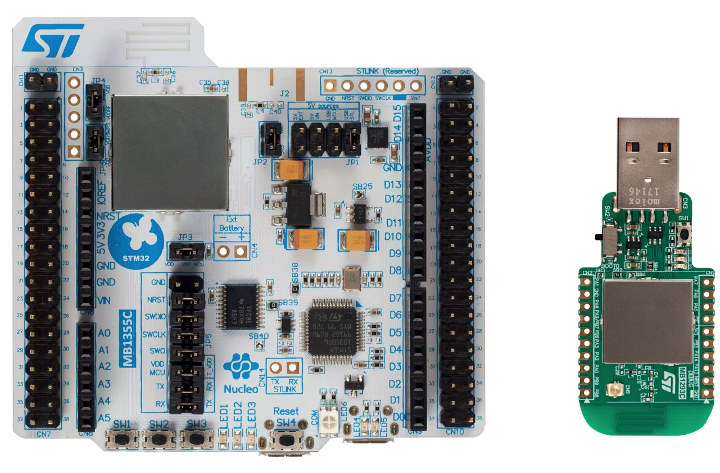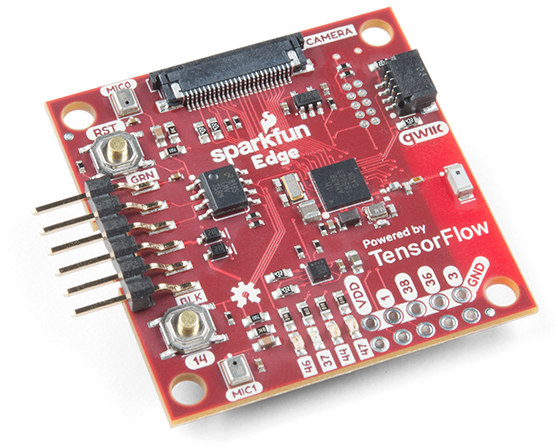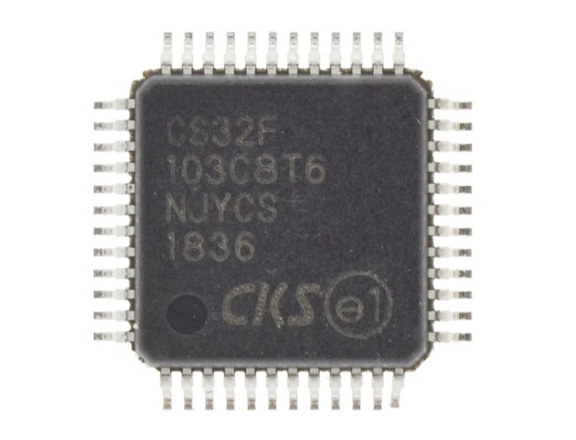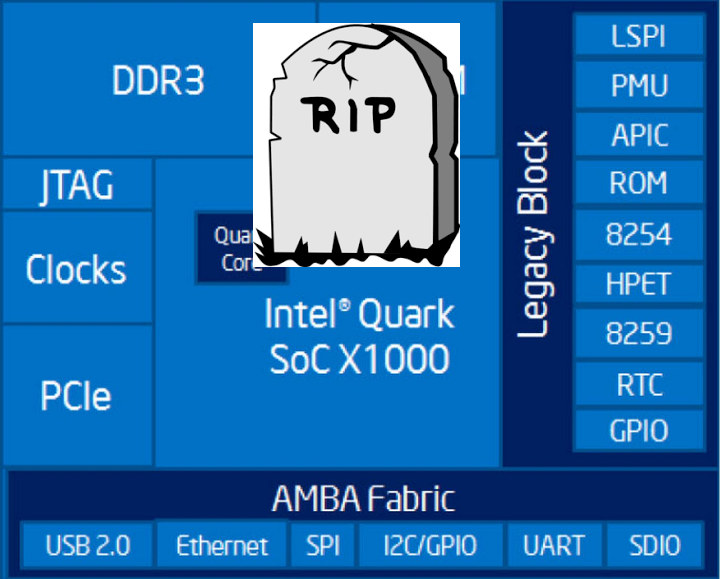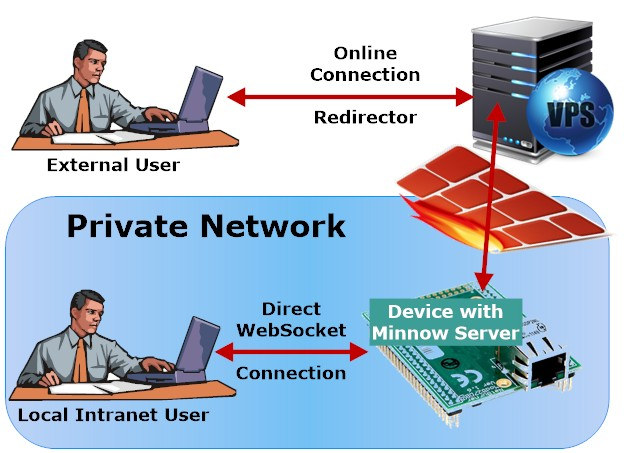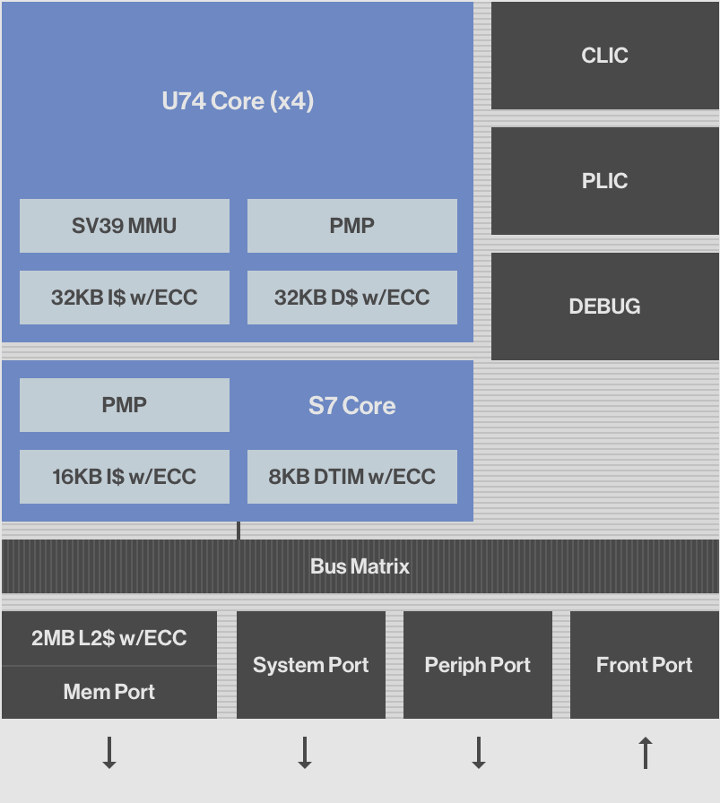STMicro unveiled their first STM32 Wireless MCU family at Embedded World 2018 last year with STM32WB dual-core Cortex-M4/M0+ microcontroller equipped with Bluetooth 5 and 802.15.4 radios, but it was only this year at Embedded World 2019 that the company announced commercial availability of STM32WB55 family as well as the P-NUCLEO-WB55 development pack containing a classical Nucleo 64 board and a USB dongle. STMicro STM32WB55 Bluetooth 5 & 802.15.4 MCU Key features and specifications: Application Core – Arm Cortex-M4 CPU @ up to 64 MHz with FPU, adaptive real-time accelerator (ART Accelerator), MPU, 80 DMIPS and DSP instructions Memory – Up to 256 KB RAM, including 64 KB with hardware parity check, 20×32-bit Backup Register Storage Up to 1 MB Flash with sector protection (PCROP) against R/W operations for Bluetooth Low Energy and 802.15.4 SW stack Quad SPI memory interface with XIP Radio 2.4 GHz RF transceiver supporting Bluetooth 5 and […]
$15 Sparkfun Edge Board Supports Tensorflow Lite for Microcontrollers
The 2019 TensorFlow Dev Summit is now taking place, and we’ve already covered the launch of Google’s Coral Edge TPU dev board and USB accelerator supporting TensorFlow Lite, but there has been another interesting new development during the event: TensorFlow Lite now also supports microcontrollers (MCU), instead of the more powerful application processors. You can easily get started with Tensorflow Lite for MCU with SparkFun Edge development board powered by Ambiq Micro Apollo3 Blue Bluetooth MCU whose ultra-efficient Arm Cortex-M4F core can run TensorFlow Lite using only 6uA/MHz. SparkFun Edge specifications: MCU – Ambiq Micro Apollo3 Blue 32-bit Arm Cortex-M4F processor at 48MHz / 96MHz (TurboSPOT) with DMA, 1MB flash, 384 KB SRAM, 6uA/MHz power usage, Bluetooth support. Connectivity – Bluetooth LE 5 (on-chip) + Bluetooth antenna Camera – OV7670 camera connector Audio – 2x MEMS microphones with operational amplifier Sensor – STMicro LIS2DH12 3-axis accelerometer Expansion – Qwiic connector, […]
WCH CH572 is a RISC-V MCU with Bluetooth LE Connectivity
Jiangsu Qinheng Co., Ltd, better known as WCH, is famous for their USB to TTL chip such as CH340, but the company also offers various wireless MCUs, including some Arm Cortex-M0 based Bluetooth / Zigbee parts such as CH579. But today, I was informed a new Bluetooth MCU showed up on WCH website: CH572 with a RISC-V MCU core @ 60 MHz. We have limited information about the MCU, but here’s what we need so far about CH572 specifications: Core – RISC-V MCU @ up to 60 MHz System Memory – 10K SRAM Storage – 96KB OTP (One-Time Programming) flash Connectivity – Bluetooth LE USB – 1x USB host, 1x USB device Other Peripherals and I/Os 11-ch 12-bit ADC 3x 26-bit timers 11x PWM 2x UART, 1x SPI 23x GPIOs RTC and Watchdog Supply Voltages – 3.3V/2.5V Package – QFN28 The main downside is that’s an OTP flash, so you’d […]
Arm Helium Delivers up to 15x Performance Uplift for Machine Learning on Cortex-M MCUs
Arm has just unveiled Armv8.1-M architecture that adds Arm Helium technology, the M-Profile Vector Extension (MVE) for the Arm Cortex-M cores that will improve the compute performance of Cortex-M based microcontrollers. Helium will deliver up to 15 times more machine learning (ML) performance and up to 5 times uplift to signal processing allowing local decision-making on low-power embedded devices. Helium instructions will enable new applications for Arm Cortex-M microcontrollers in audio devices, sensor hubs, keyword spotting, voice command control, power electronics, communications and still image processing. Helium and Neon (the Advanced SIMD technology for Arm Cortex-A processors) are similarities but Helium has been designed for efficient signal processing performance in small processors. One different illustrated below is that while NEON loads 128-bit instructions (e.g. VLDR, VLMA), Helium will split up 128‑bit wide instruction into four equally sized chunks, called “beats” (labelled A to D) due to difference between Cortex-M and […]
CS32 MCU Clone of STM32 Makes it into Bluepill Board
A few year ago, we covered GigaDevice GD32 MCU based on STM32 Arm Cortex-M3 microcontroller, but with some improvements to the flash and overall performance. So the MCU is not exactly an STM32 clone per se, but it’s pin-to-pin and software compatible. Now based on a discussion on STM32duino forum, it looks like another company (CKS – 中科芯微) may have made an actual clone of STM32 with CS32, more exactly CS32F103 that is compatible with STM32F103. CS32 comes with an Arm Cortex-M3 core clocked at 72 MHz, 64 to 128KB flash, and 20 KB RAM. A datasheet and user manual are available but only in Chinese. Several STM32duino members suspect it’s an actual copy of STM32 without modifications. What’s unclear is whether it’s a pirated copy, or a properly licensed one. CS32F103C8T6 & CS32F103CBT6 parts can be purchased on Aliexpress for $0.80 shipped and up. The datasheet mentions 64KB or […]
Intel Phases Out Quark SoCs and Microcontrollers
I had completely forgotten about Intel Quark SoCs and MCUs found in development kits and modules such as the Arduino 101 board or Intel Curie module. Last time I heard about those chips, Intel had just discontinued several boards including the two aforementioned products, and I just assumed the Quark chips had quietly reached end-of-life as well. But actually those will still be available for a bit longer, with Intel having just issued a product change notification for the discontinuance & end of life of the following parts: Intel Quark SoC X1020D Intel Quark SoC X1000 Intel Quark SoC X1010 Intel Quark SoC X1021D Intel Quark SoC X1001 Intel Quark SoC X1011 Intel Quark SoC X1020 Intel Quark SoC X1021 Intel Quark Microcontroller D1000 Intel Quark Microcontroller D2000 Intel Quark SE C1000 Microcontroller Intel Quark Microcontroller D2000 Intel Quark SE C1000 Microcontroller In case you have a product based one […]
Minnow Server is a Secure Web Server for Microcontrollers
Many embedded systems have a limited amount of memory, which would normally run programs with smaller footprints than on desktops or servers. For example, nginx and Apache2 are the common web servers, but on hardware with limited memory, smaller footprint web servers may be required, so that’s why I wrote a list of web servers for embedded systems running Linux/uClinux many years ago. But now, even platforms based on microcontrollers often need to run web server usually for configuration. We’ve already shown how to use Arduino to serve a simple web page and did the same in Getting Started with NodeMCU Board Powered by ESP8266 WiSoC but using Lua programming language instead. It may be more convenient to run a proper web server however, as it’s easier to change the interface, and we previously covered MicroWebSrv lightweight web server that works on platforms running MicroPython such as Pycom boards. Real Time […]
SiFive Introduces 7 Series RISC-V Cores with E7, S7 and U7 series
SiFive has recently announced their Core IP 7 Series of RISC-V cores offering better performance, and designed to enable “embedded intelligence” in applications such as 5G, networking, storage, augmented reality, artificial intelligence, SLAM, and sensor fusion. Three families of the new 7 Series been launched with namely SiFive E7, S7 and U7 Core IP Series, so let’s have a look at each of them. E7 Core IP Series – E76 and E76-MC Cores The E7 Core IP Series comprises the 32-bit E76 and E76-MC (Multi-core), provides hard real-time capabilities, and compares to Arm’s Cortex M7, Cortex-R7/R8 cores. E76-MC Key Features Fully compliant with the RISC-V ISA specification 4x RV32IMAFC E76 Cores Machine and User Mode Support In-order, 8-stage pipeline Advanced Memory Subsystem 32KB Instruction Cache 32KB Instruction Tightly Integrated Memory (ITIM) 32KB Data Cache 32KB FIO RAM 256KB L2 Cache High-performance TileLink Interface Benchmark Scores- 2.3 DMIPS/MHz, 4.9 CoreMark/MHz E76 […]


